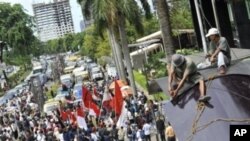Anti-corruption activists gathered in Jakarta to mark international anti-corruption day and demand an end to endemic graft that places Indonesian well down on Transparency International's global Corruption Perceptions Index.
Music fills the air outside Indonesia's Corruption Eradication Commission, adding to a carnival-like atmosphere. Thursday began with parades of protesters and an actor dressed as a rogue tax official tossing out wads of fake cash to the crowd.
Later, though, it turned violent, as police clashed with protesters gathered to draw attention to widespread graft, which they say is one of Indonesia's most pressing problems.
Despite changes to make it easier to do business and pay taxes, Indonesia still sits far below India and China on global transparency rankings.
Even the commission tasked with rooting out corruption has been surrounded by scandal since last year, when two of its commissioners were charged with bribery on what activists call trumped-up charges.
Anies Baswedan, dean of Paramadina University, says corruption exists because of need, greed and a political system that rewards bad behavior. And that impedes job creation, economic growth and development.
"For developing countries like Indonesia, producing development that will benefit the people requires transparency, good governance, in order to ensure that those who need the development programs actually get it," said Baswedan.
Indonesia tied with five other countries for 110th place in Transparency International's latest Corruption Perception Index. Denmark ranked highest, and Somalia came in last among the 178 economies surveyed.
Elsewhere in Asia, Singapore, Hong Kong and Japan all ranked in the top 20, while Burma and Afghanistan tied for 176th place at the bottom.
Corruption creates uncertainty, Baswedan says, since business ventures and development projects are often awarded to vested interests. Despite these problems, Indonesia has made progress in combating graft in the 12 years since autocratic President Suharto stepped down.
Banking reforms have been credited with helping Indonesia to weather the global financial crisis. The country has seen an influx of foreign capital over the past year.
Baswedan says political and public support for anti-corruption efforts has increased dramatically, and he credits Indonesia's move to democracy for increasing the space for public debate.
"In a country in which media is highly controlled, the practice of corruption is there, but it doesn't translate into a public discourse the way it does in Indonesia with the help of media," added Baswedan. "And I think that helps for us to see that there is a light at the end of this problem,"
Transparency International says politicians who fight for their own interests over the interests of the state pose one of the biggest challenges to combating corruption. Organizations that advocate for more transparency say politically connected individuals still evade investigation.
Baswedan says the solution rests in better education. Paramadina University requires students to take a course on corruption, in which they do investigative reports on the issue. The hope is that students can learn to fight corruption when they enter the job market.
Anti-Corruption Campaign Takes to the Streets in Jakarta




